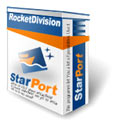 | Choose software product here |

| HOME | ABOUT US | CONTACT US | PRODUCTS | DOWNLOAD / ORDER | PARTNERS | CUSTOMERS | NEWS |
StarPort iSCSI and ATA-over-Ethernet Initiator
StarPort fully implements iSCSI, FCoE and ATA-over-Ethernet client side protocols enabling you to connect to remote storage appliances such as disk arrays, tape drives, DVD-ROM image libraries and so on. StarPort connects to iSCSI, FCoE or AoE (ATA-over-Ethernet) storage in the server room or creates a virtual DVD-ROM drive locally to watch movies in a home theatre extending your computing infrastructure. StarPort's iSCSI support enables connectivity to remote storage devices over a standard IP network, regardless of where the device resides; in the next room or on another continent. With StarPort and iSCSI you can gain full access to a device, as though the device was installed on a local machine. Re-partition, format a remote hard disk drive with any file system, burn to a remote high-capacity Blu-Ray or HD-DVD burner, implement automatic backup procedures to a remote tape drive, access remote storage devices connected through Serial and Parallel ATA and SCSI, Fibre Channel, USB or FireWire and more. AoE protocol support provides the same functionality as iSCSI in those environments where ATA-over-Ethernet technology is used. CoRAID produces network storage appliances currently using AoE as the core protocol. AoE delivers a simple, high performance, low cost alternative to iSCSI and FibreChannel for networked block storage by eliminating the processing overhead of TCP/IP. AoE is native in Linux 2.6.11 and beyond. A free open source ATA-over-Ethernet target implementation for Linux called vblade can be downloaded here. Unsatisfied with the speed of disk I/O operations? Need a fast drive to store Internet Explorer cache files? Use StarPort's RAM drive emulation which is more than 1000 times faster than your local hard drive. A RAM drive appears to your system and applications as a standard disk volume where you can read and write files. Non longer limited to the hard drives speed, the StarPort RAM drive feature provides amazingly faster speed. A virtual DVD-ROM emulation module enables as many ready to use optical drives as needed. Create an ISO or MDS image of your CD/DVD or Blu-Ray/HD-DVD drive with any disk grabbing utility (we suggest you use Rocket Division Software Grab&Burn or Alcohol 120% from Alcohol Software) and save it to your hard drive. Any time you need to read data or run applications from that image, mount it as a virtual DVD-ROM drive in StarPort. The image will appear as a new optical drive in your system which can be used it transparently as though it is a local DVD-ROM drive.
Key Benefits:
Storage Consolidation: Consolidate all storage in the server room to increase application "up time" and simplify administration. The entire storage pool can be centrally managed eliminating the need to separately maintain "islands" of disks. Any iSCSI Target can be used with StarPort which connects to iSCSI disk volumes from a Microsoft Windows machine. Outstanding Performance: StarPort is a "domestic" iSCSI Initiator for the StarWind iSCSI Target. This combination provides unbeatable performance compared to the Microsoft iSCSI Initiator run against third-party iSCSI targets. Automatic Replication: Replication of mission-critical data to another site over a low-bandwidth connection is built-in into StarWind. The StarPort iSCSI Initiator should be co-installed with StarWind on the same machine to provide iSCSI private connection services to StarWind. Share Physical Devices: Tape drives and ultra-modern high-capacity Blu-Ray and HD-DVD burners can be shared over a standard IP network, leveraging existing tape backup and CD/DVD/Blu-Ray/HD-DVD burning applications allowing backups to a remotely located tape or optical media drive. There's no need to issue every single user with a dedicated hardware box if it cab be shared among multiple users. StarWind is currently the only iSCSI Target for Microsoft Windows which allows sharing of physical storage hardware "AS IS". VTL (Virtual Tape Library) emulation: Future versions of StarPort will support VTL (Virtual Tape Library) emulation and Microsoft VDS (Virtual Disk Services) making disk-to-disk-to-tape backup and storage management even easier then today. Create Media Libraries: Standard ISO and MDS images can be mounted to virtual DVD-ROM drives creating media libraries exported via SMB. Original physical media would stay unscratched in the storage room while people work with the images over SMB protocol.
Key Features:
Supported Platforms:
StarPort is compatible with 32-bit and 64-bit Microsoft Windows 2000/XP/2003/Vista/Longhorn. StarPort is tested for compatibility with a wide range of hardware and software iSCSI target implementations from the leading vendors.
System Requirements:
Minimum System Requirements:
Recommended System Requirements:
Documentation and On-Line Help:
|
| ||||||||||||||||||||||
|


